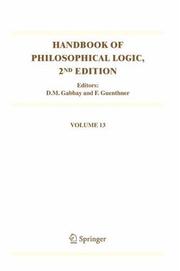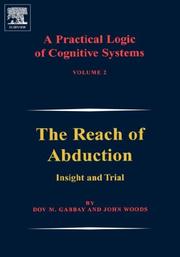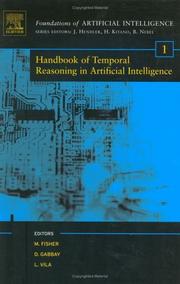| Listing 1 - 7 of 7 |
Sort by
|

ISBN: 1402035209 9048168902 9786610411726 1280411724 1402035217 079237018X 0792371267 0792371607 1402001398 1402002351 1402005830 1402005997 1402006659 1402006993 1402016441 1402019661 1402030916 9789048158775 9781402002359 9789048160044 9781402005992 9781402006654 9789048160556 9789401745246 9781402019661 1402030924 9781402030918 9781402035203 9781402063237 9789400704848 9400704798 9789400704787 9400766009 9789400766006 9048167892 9786610411702 1280411708 9780792370185 9780792371267 9780792371601 9781402001390 9781402006999 9781402016448 9781402035210 1402063237 9781402063244 904815717X 9401598339 9048157536 940170452X 904815765X 9401704546 904815877X 9401704562 904815927X 9401704589 9048160049 9401704600 9048160111 9401704627 9048160553 9401704643 9048165547 940170466X 9048164311 9401745242 9401039194 9401003874 9781402005831 9400704844 940070478X Year: 2005 Volume: 16 Publisher: Dordrecht ; Boston : Kluwer Academic Publishers,
Abstract | Keywords | Export | Availability | Bookmark
 Loading...
Loading...Choose an application
- Reference Manager
- EndNote
- RefWorks (Direct export to RefWorks)
Intended to comprise some 18 volumes and provides an in-depth coverage of major topics in philosophical logic and its applications in many fields relating to computer science, language, argumentation, and more. This work is aimed at students and researchers whose work or interests involve philosophical logic and its applications.
Logic. --- Philosophy & Religion --- Logic --- Philosophy --- Philosophy. --- Mental philosophy --- Argumentation --- Deduction (Logic) --- Deductive logic --- Dialectic (Logic) --- Logic, Deductive --- Philosophy, general. --- Humanities --- Intellect --- Psychology --- Science --- Reasoning --- Thought and thinking --- Methodology --- Logique --- EPUB-LIV-FT LIVPHILO SPRINGER-B --- Philosophy (General). --- Computational linguistics. --- Computational Linguistics. --- Automatic language processing --- Language and languages --- Language data processing --- Linguistics --- Natural language processing (Linguistics) --- Applied linguistics --- Cross-language information retrieval --- Mathematical linguistics --- Multilingual computing --- Data processing
Book
ISBN: 1280411708 9786610411702 1402030924 Year: 2005 Publisher: Dordrecht ; Boston : Kluwer Academic Publishers,
Abstract | Keywords | Export | Availability | Bookmark
 Loading...
Loading...Choose an application
- Reference Manager
- EndNote
- RefWorks (Direct export to RefWorks)
The first edition of the Handbook of Philosophical Logic (four volumes) was published in the period 1983-1989 and has proven to be an invaluable reference work to both students and researchers in formal philosophy, language and logic. The second edition of the Handbook is intended to comprise some 18 volumes and will provide a very up-to-date authoritative, in-depth coverage of all major topics in philosophical logic and its applications in many cutting-edge fields relating to computer science, language, argumentation, etc. The volumes will no longer be as topic-oriented as with the first edition because of the way the subject has evolved over the last 15 years or so. However the volumes will follow some natural groupings of chapters. Audience: Students and researchers whose work or interests involve philosophical logic and its applications.
Logic. --- Philosophy. --- Mental philosophy --- Humanities --- Argumentation --- Deduction (Logic) --- Deductive logic --- Dialectic (Logic) --- Logic, Deductive --- Intellect --- Philosophy --- Psychology --- Science --- Reasoning --- Thought and thinking --- Methodology --- Philosophy (General). --- Philosophy, general.

ISBN: 9780444517913 044451791X 0080460925 9780080460925 9786610628834 1280628839 Year: 2005 Publisher: Amsterdam ; Boston : North Holland,
Abstract | Keywords | Export | Availability | Bookmark
 Loading...
Loading...Choose an application
- Reference Manager
- EndNote
- RefWorks (Direct export to RefWorks)
The present work is a continuation of the authors' acclaimed multi-volume APractical Logic of Cognitive Systems. After having investigated the notion ofrelevance in their previous volume, Gabbay and Woods now turn to abduction. Inthis highly original approach, abduction is construed as ignorance-preservinginference, in which conjecture plays a pivotal role. Abduction is a response to acognitive target that cannot be hit on the basis of what the agent currently knows.The abducer selects a hypothesis which were it true would enable the reasoner to attain his target. He co
Logic --- Abduction (Logic). --- Induction (Logic). --- Logic. --- Philosophy.

ISBN: 9780444517913 044451791X 0080460925 9780080460925 1280628839 9786610628834 Year: 2005 Publisher: San Diego, Calif Elsevier
Abstract | Keywords | Export | Availability | Bookmark
 Loading...
Loading...Choose an application
- Reference Manager
- EndNote
- RefWorks (Direct export to RefWorks)
The present work is a continuation of the authors' acclaimed multi-volume APractical Logic of Cognitive Systems. After having investigated the notion ofrelevance in their previous volume, Gabbay and Woods now turn to abduction. Inthis highly original approach, abduction is construed as ignorance-preservinginference, in which conjecture plays a pivotal role. Abduction is a response to acognitive target that cannot be hit on the basis of what the agent currently knows.The abducer selects a hypothesis which were it true would enable the reasoner to attain his target. He co
Logic --- Logic. --- Philosophy.

ISBN: 1281119733 9786611119737 0080533361 0444514937 9780080533360 9780444514936 9781281119735 6611119736 Year: 2005 Publisher: Amsterdam Boston Elsevier
Abstract | Keywords | Export | Availability | Bookmark
 Loading...
Loading...Choose an application
- Reference Manager
- EndNote
- RefWorks (Direct export to RefWorks)
This collection represents the primary reference work for researchers and students in the area of Temporal Reasoning in Artificial Intelligence. Temporal reasoning has a vital role to play in many areas, particularly Artificial Intelligence. Yet, until now, there has been no single volume collecting together the breadth of work in this area. This collection brings together the leading researchers in a range of relevant areas and provides an coherent description of the breadth of activity concerning temporal reasoning in the filed of Artificial Intelligence.Key Features:- Broad
Temporal databases. --- Artificial intelligence. --- Reasoning. --- Argumentation --- Ratiocination --- Reason --- Thought and thinking --- Judgment (Logic) --- Logic --- AI (Artificial intelligence) --- Artificial thinking --- Electronic brains --- Intellectronics --- Intelligence, Artificial --- Intelligent machines --- Machine intelligence --- Thinking, Artificial --- Bionics --- Cognitive science --- Digital computer simulation --- Electronic data processing --- Logic machines --- Machine theory --- Self-organizing systems --- Simulation methods --- Fifth generation computers --- Neural computers --- Temporal data bases --- Databases

ISBN: 9780080533360 0080533361 1281119733 9781281119735 9786611119737 6611119736 9780444514936 0444514937 Year: 2005 Publisher: Boston Elsevier
Abstract | Keywords | Export | Availability | Bookmark
 Loading...
Loading...Choose an application
- Reference Manager
- EndNote
- RefWorks (Direct export to RefWorks)
This collection represents the primary reference work for researchers and students in the area of Temporal Reasoning in Artificial Intelligence. Temporal reasoning has a vital role to play in many areas, particularly Artificial Intelligence. Yet, until now, there has been no single volume collecting together the breadth of work in this area. This collection brings together the leading researchers in a range of relevant areas and provides an coherent description of the breadth of activity concerning temporal reasoning in the filed of Artificial Intelligence.Key Features:- Broad
Periodical
Year: 2005 Publisher: London College Publications
Abstract | Keywords | Export | Availability | Bookmark
 Loading...
Loading...Choose an application
- Reference Manager
- EndNote
- RefWorks (Direct export to RefWorks)
| Listing 1 - 7 of 7 |
Sort by
|

 Search
Search Feedback
Feedback About UniCat
About UniCat  Help
Help News
News